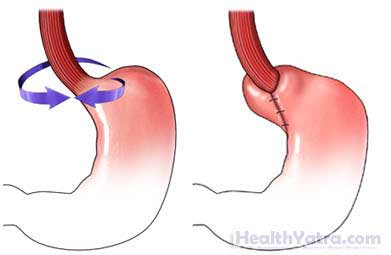تعريف
Fundoplication is a surgery on the stomach and esophagus. It is done to treatgastroesophageal reflux disease (GERD). GERD is also called acid reflux, or heartburn. This occurs when acid from the stomach goes up the esophagus. A hiatal hernia may also be fixed during this procedure. This type of hernia occurs when a portion of the stomach pokes into the chest cavity. This hernia increases the chance and severity of GERD.

أسباب هذا الإجراء
The surgery is most often done for the following reasons:
- Eliminate persistent GERD symptoms that are not relieved by medicine
- Correct acid reflux that is contributing to asthma symptoms
- Repair a hiatal hernia, which may be responsible for making GERD symptoms worse
- Eliminate the source of serious, long-term complications resulting from too much acid in the esophagus
المضاعفات المحتملة
If you are planning to have fundoplication, your سيقوم الطبيب بمراجعة القائمة من المضاعفات المحتملة، والتي قد تشمل:
- المشاكل المتعلقة بالتخدير
- العدوى
- نزيف
- صعوبة في البلع
- Return of reflux symptoms
- Limited ability to burp or vomit
- Gas pains
- الأضرار التي لحقت الأجهزة الأخرى
In rare cases, the procedure may need to be repeated. This may happen if the wrap was too tight, the wrap slips, or if a new hernia forms.
بعض العوامل التي قد تزيد من خطر المضاعفات تشمل:
- Pre-existing heart or lung conditions
- السمنة
- التدخين
- مرض السكري
- Prior upper abdominal surgery
- Age: 70 years of age or older
ما يمكن توقعه
قبل الإجراء
قد يقوم طبيبك بما يلي:
- اختبار بدني
- X-ray —a test that uses radiation to take a picture of structures inside the body, especially bones
- Endoscopy —use of a tube attached to a viewing device (an endoscope) to examine the inside of the lining of the esophagus and stomach; a biopsy may also be taken
- Manometry—a test to measure the muscular contractions inside the esophagus and its response to swallowing
قبل الجراحة:
- التحدث مع طبيبك عن الأدوية الخاصة بك. قد يطلب منك التوقف عن تناول بعض الأدوية تصل إلى أسبوع واحد قبل العملية مثل:
- الأدوية المضادة للالتهابات (مثل الأسبرين)
- Blood thinners, like warfarin (Coumadin)
- كلوبيدوجريل (بلافيكس)
- رتب لتوصيلة من وإلى المستشفى. أيضا ، رتب للحصول على المساعدة في المنزل.
- في الليلة السابقة ، تناول وجبة خفيفة. لا تأكل أو تشرب أي شيء بعد منتصف الليل.
التخدير
General anesthesia will be used. It will block any pain and keep you asleep through the surgery.
وصف الإجراء
Laparoscopic Procedure
The doctor will make a small incision. The laparoscope (a small tool with a camera on the end) will be inserted into the abdomen. It will allow the doctor to view the inside of the body on a video screen. Gas will be pumped into the abdomen to improve the view. The doctor will make other, small incisions in the skin. Small surgical instruments will be inserted. The stomach will then be wrapped around the esophagus. If needed, the hernia will be repaired.
In some cases, the doctor may need to switch to an open surgery. He will make a wide incision in the abdomen to do the surgery.
كم من الوقت سيستغرق ؟
2-4 hours
كم هو مؤلم ؟
You will have discomfort during recovery. Ask your doctor about medicine to help with the pain.
متوسط الإقامة في المستشفى
Two days or more (depending on your condition)
رعاية ما بعد العملية
- Walk with assistance the day after surgery.
- حافظ على منطقة الشق نظيفة وجافة.
- اسأل طبيبك حول, عندما هي آمنة للاستحمام, السباحة, أو نقع في الماء.
- You will start by eating a liquid diet. You will slowly be able to eat more solid foods.
- After a successful fundoplication, you may no longer need to take medicines for GERD.
- تأكد من اتباع تعليمات طبيبك.
It will take about two weeks to recover.
استدعاء الطبيب
بعد مغادرة المستشفى، اتصل بطبيبك في حالة حدوث أي مما يلي:
- علامات الإصابة, بما في ذلك حمى وقشعريرة
- احمرار أو تورم أو ألم متزايد أو نزيف شديد أو أي إفرازات من موقع الشق
- الغثيان و / أو القيء الذي لا يمكنك السيطرة عليه بالأدوية التي أعطيت لك بعد الجراحة ، أو التي تستمر لأكثر من يومين بعد الخروج من المستشفى
- Increased swelling or pain in the abdomen
- Difficulty swallowing that does not improve
- ألم لا يمكنك السيطرة عليه بالأدوية التي أعطيت لك
- ألم أو حرقة أو إلحاح أو كثرة التبول أو نزيف مستمر في البول
- سعال أو ضيق في التنفس أو ألم في الصدر
- Any other new symptoms
في حالة الطوارئ ، اتصل على المساعدة الطبية على الفور.
